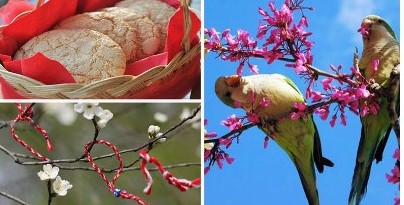DITE E VERËS

January 9, 2023
Dita e verës is a festival celebrated annually in Albania on March 1st, from the Julian calendar (45 BC). It officially became a holiday in 2004 (Spring comes to the Balkans). The name, “Dita e Verës” means Summer day or as others know it, Happy Summer Day. It’s rooted in Greek, Roman, and Albanian religions. It’s celebrated all throughout Albania however, it comes with regional differences. It’s the country’s largest pagan celebration (Spring is in the Air). Bonfires are usually lit in backyards to drive away the cold, dark, winter night and welcome the warmth of the Sun in summer. The fires also signify the sun’s purity and strength. In the Albanian city, Elbasan, Diana, the goddess of forests, greenery, and nature is celebrated in this festival. The temple of Zana Malit, Muse of the Mountain, in Elbasan was when this special event first sprung. Zana and Diana, the goddesses would only come out of their temple on this day. This is the reason why the holiday is celebrated from March 1st to March 14th. Eventually, it became significant to the entire country. Some people wear a “verore,” which is a red and white bracelet. To celebrate, the bracelet is worn until the first hint of spring. After they remove the bracelets, they hang it on a tree for birds to use for their nest as a form of luck to welcome the upcoming season. This is just one of the many customs that come with Dita e Verës.
Along with this holiday, comes quality time with friends and family, as well as loads of food. Not only does the holiday bring families together, it preserves cultural heritage. Butter cookies, also known as Ballokuma, are a famous dessert throughout this holiday. These cookies are made with butter, sugar, corn flour, and egg yolks. Along with these cookies, raki, an alcoholic drink made of twice-distilled grapes, is served. Many cities and towns within Albania take days, even weeks, to cook food for this memorable holiday.
Ozi Bozi is “the call for children roaming the streets of the town.” They hold baskets and knock on doors for sweets and fruits (Happy Summer Day). Kids are normally given nuts and figs in celebration of this special day. Before the celebrations begin, “kulaç is rolled down a hill” and the first farmer to catch one is promised a good year in the fields (Happy Summer Day). In the towns and cities, people crowd, walking the streets, and buying food at the nearby food stands. At midnight, they hold a massive concert with common singers. Usually the day before Dita e Verës, people will “search for a clump of grass with soil and the roots,” keeping it as a sign of good luck in their home (Best Festivals in Albania). As well as being a holiday of celebration, it’s also a time of rejuvenation. It’s common for the eldest woman of the family to “put grass under the pillows of children the night before.” This calls upon rejuvenation. Parents leave the door open to symbolize “generosity and fertilize[ing] the olive trees” (Spring comes to the Balkans). This culturally rich holiday is not just celebrated in Albania, but in other European countries as well. Each country had its own tricks and twists to this day, celebrating it a little differently. Each year more and more visitors come from around the world to celebrate this special event. This holiday, as well as others, keeps a family and friends traditional atmosphere among Albanians. At the end of the day, Albanians wish each other to live long, healthy, happy lives.




















